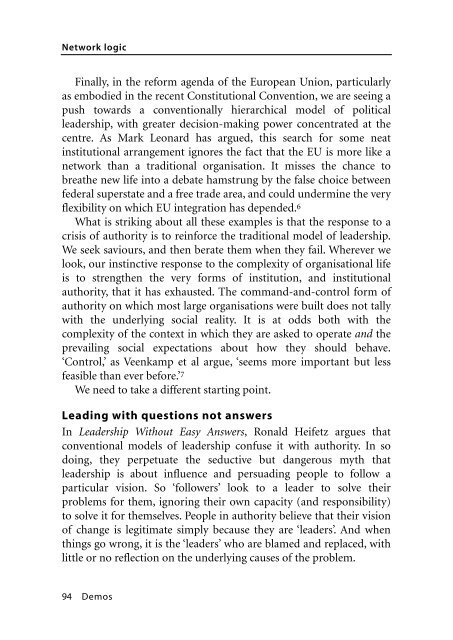Network Logic - Index of
Network Logic - Index of
Network Logic - Index of
You also want an ePaper? Increase the reach of your titles
YUMPU automatically turns print PDFs into web optimized ePapers that Google loves.
<strong>Network</strong> logic<br />
Finally, in the reform agenda <strong>of</strong> the European Union, particularly<br />
as embodied in the recent Constitutional Convention, we are seeing a<br />
push towards a conventionally hierarchical model <strong>of</strong> political<br />
leadership, with greater decision-making power concentrated at the<br />
centre. As Mark Leonard has argued, this search for some neat<br />
institutional arrangement ignores the fact that the EU is more like a<br />
network than a traditional organisation. It misses the chance to<br />
breathe new life into a debate hamstrung by the false choice between<br />
federal superstate and a free trade area, and could undermine the very<br />
flexibility on which EU integration has depended. 6<br />
What is striking about all these examples is that the response to a<br />
crisis <strong>of</strong> authority is to reinforce the traditional model <strong>of</strong> leadership.<br />
We seek saviours, and then berate them when they fail. Wherever we<br />
look, our instinctive response to the complexity <strong>of</strong> organisational life<br />
is to strengthen the very forms <strong>of</strong> institution, and institutional<br />
authority, that it has exhausted. The command-and-control form <strong>of</strong><br />
authority on which most large organisations were built does not tally<br />
with the underlying social reality. It is at odds both with the<br />
complexity <strong>of</strong> the context in which they are asked to operate and the<br />
prevailing social expectations about how they should behave.<br />
‘Control,’ as Veenkamp et al argue, ‘seems more important but less<br />
feasible than ever before.’ 7<br />
We need to take a different starting point.<br />
Leading with questions not answers<br />
In Leadership Without Easy Answers, Ronald Heifetz argues that<br />
conventional models <strong>of</strong> leadership confuse it with authority. In so<br />
doing, they perpetuate the seductive but dangerous myth that<br />
leadership is about influence and persuading people to follow a<br />
particular vision. So ‘followers’ look to a leader to solve their<br />
problems for them, ignoring their own capacity (and responsibility)<br />
to solve it for themselves. People in authority believe that their vision<br />
<strong>of</strong> change is legitimate simply because they are ‘leaders’. And when<br />
things go wrong, it is the ‘leaders’ who are blamed and replaced, with<br />
little or no reflection on the underlying causes <strong>of</strong> the problem.<br />
94 Demos
















